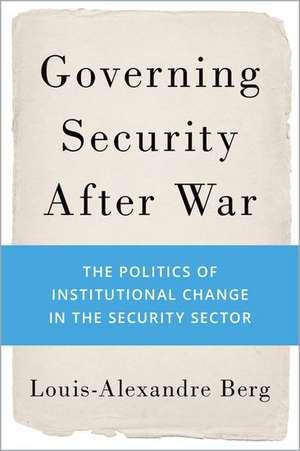Governing Security After War: The Politics of Institutional Change in the Security Sector
Autor Louis-Alexandre Bergen Limba Engleză Hardback – 4 iul 2022
Preț: 576.52 lei
Preț vechi: 711.76 lei
-19% Nou
Puncte Express: 865
Preț estimativ în valută:
110.33€ • 114.53$ • 91.100£
110.33€ • 114.53$ • 91.100£
Carte disponibilă
Livrare economică 03-17 martie
Preluare comenzi: 021 569.72.76
Specificații
ISBN-13: 9780197572382
ISBN-10: 0197572383
Pagini: 320
Dimensiuni: 238 x 163 x 29 mm
Greutate: 0.63 kg
Editura: Oxford University Press
Colecția OUP USA
Locul publicării:New York, United States
ISBN-10: 0197572383
Pagini: 320
Dimensiuni: 238 x 163 x 29 mm
Greutate: 0.63 kg
Editura: Oxford University Press
Colecția OUP USA
Locul publicării:New York, United States
Recenzii
International actors have long sought to help post-conflict societies build new militaries—often with mixed success. Berg's new book provides an illuminating explanation for why they are likely to succeed and fail. He shows how local political elites' struggles to consolidate power—and the resources and networks on which they rely—shape the management and control of the armed forces. Fascinating and compelling, Berg's research is a major advancement in understanding the character and origins of states' security sectors.
This is a fantastic book. Louis-Alexandre Berg demonstrates how a clearer understanding of the interplay between elite actors' interests in war-torn states holds the key to crafting strategies for lasting security sector reform. Wonderfully executed, this is an important contribution to the study of post-conflict reform. Arguing against the now common claim in the wake of the American withdrawal from Afghanistan that recipients of assistance inevitably lack the political will to use it wisely, Berg shows how the right kinds of international attention to domestic political dynamics can leverage real domestic interest in reform. This well-written book is a must-read for scholars and practitioners, and will have a lasting effect on how we think about security sector reform.
Berg's volume, Governing Security after War, really sets the scene by providing an overarching framework to institutional interventions.
This is a fantastic book. Louis-Alexandre Berg demonstrates how a clearer understanding of the interplay between elite actors' interests in war-torn states holds the key to crafting strategies for lasting security sector reform. Wonderfully executed, this is an important contribution to the study of post-conflict reform. Arguing against the now common claim in the wake of the American withdrawal from Afghanistan that recipients of assistance inevitably lack the political will to use it wisely, Berg shows how the right kinds of international attention to domestic political dynamics can leverage real domestic interest in reform. This well-written book is a must-read for scholars and practitioners, and will have a lasting effect on how we think about security sector reform.
Berg's volume, Governing Security after War, really sets the scene by providing an overarching framework to institutional interventions.
Notă biografică
Louis-Alexandre Berg is Assistant Professor of Political Science at Georgia State University. His research examines the causes and consequences of violent conflict and crime in developing countries, and the effects of international security assistance and peacebuilding programs. He has worked extensively on peacebuilding and security assistance programs in the field, and served as an adviser to the United Nations, the World Bank, and the U.S. Government. He holds a PhD from Georgetown University, an MA from Princeton University, and a BA from Brown University.
